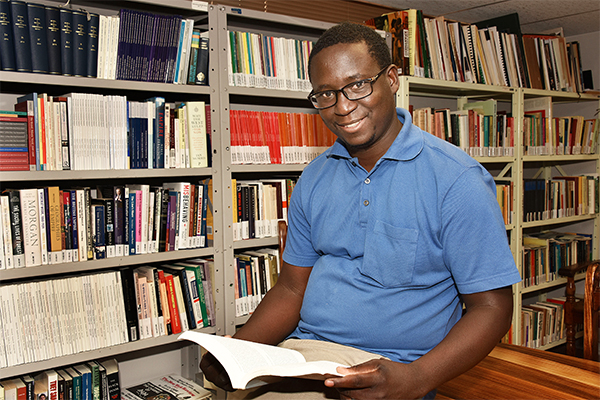Latest News Archive
Please select Category, Year, and then Month to display items
27 August 2019
|
Story Moeketsi Mogotsi
|
Photo Johan Roux
 Katleho Lechoo, newly elected SRC President on the Bloemfontein Campus and Sonawible Dwaba, outgoing SRC President.
Katleho Lechoo, newly elected SRC President on the Bloemfontein Campus and Sonawible Dwaba, outgoing SRC President.
The University of the Free State’s Student Representative Council (SRC) elections took place on the Bloemfontein,
Qwaqwa, and
South campuses during August.
The following candidates were successfully elected as 2019/2020 SRC members on our three respective campuses.
BLOEMFONTEIN CAMPUS SRC:President:Katleho Lechoo
Deputy President:Agobakwe Mboweni
Secretary:Nothabo Zungu
Treasurer:Zandile Makalima
Policy and Transformation:Kamohelo Thakheli
Student Development and First-Generation Students:Thobeka Buti
Commuter Students:Karabo Mtsweni
Associations Student Council:Mandilakhe Magalakanqa
Student Organisations Council:Dieketseng Motaung
Academic Student Council:Lebofsa Malete
Day Residence Council:Gert Terblanche
Campus Residence Council:Tyrone Willard
Postgraduate Student Council:Mahlomola Khasemene
International Student Council:Simba Matem
Student Media and Dialogue Council:Karabo Masike
Universal Access and Social Justice Council:Micaula Jewell
Civic and Social Responsibility Council:Nthato Musa
Arts and Culture Council:Motshidisi Rasego
Sports Council:Sphumelele Dube
QWAQWA CAMPUS SRC:President:Xolani Sandile Sibiya
Deputy President:Thembinkosi Phenyane
Secretary General:Nelisiwe Bridget Masango
Treasurer:Ntandoyenkosi Khumalo
Policy and Transformation:Bongiwe Nakile Khumalo
Student Development and First-Generation Students:Thokozani Siphiwe Zuma
Commuter Students:Thabiso Celimpilo Masuku
Media and Publicity:Simphiwe Sinenhlanhla Dube
Associations and Religious Affairs Student Council: Sicelo Mathews Twala
Campus Residence Council: Thabo Abraham Motaung
Arts and Culture Council:Andile Saviour Maseko
Academics Council:Siyabonga Mpumelelo Mbambo
Sports Council: Tshepiso Fortune Tshabalala
Universal Access and Social Justice Council: Siphamandla Joseph Shabangu
Postgraduate Student Council:Thato Karabo Moloi
International Student Council:Mamokete Mokhatla
SOUTH CAMPUS SRC:President: Phehellang Ralejoe
Deputy President:Nokubonga Mangaliso
Secretary:Mpumelelo Ndzube
Treasurer:Sithembiso Khoza
Policy and Transformation:Casles Phasha
Commuter Students:Sthembele Kunene
 Announcement of 2019/2020 SRC
Announcement of 2019/2020 SRC
 Kathelo Leechoo, SRC President, address the crowd
Kathelo Leechoo, SRC President, address the crowd
 First sitting of the newly elected SRC on the Bloemfontein Campys
First sitting of the newly elected SRC on the Bloemfontein Campys
 First sitting of the newly elected SRC on the Bloemfontein Campys
First sitting of the newly elected SRC on the Bloemfontein Campys
 Katleho Leechoo
Katleho Leechoo
 SRC results were announced on Monday 26 August 2019
SRC results were announced on Monday 26 August 2019
 Pura Mgolombane, Dean of Student Affairs
Pura Mgolombane, Dean of Student Affairs
 The new Student Representative Council for the Bloemfontein Campus
The new Student Representative Council for the Bloemfontein Campus
Land a fertile field for historians
2017-12-25

Dr Admire Mseba, historian and researcher in the International Studies Group (ISG).
Photo: Charl Devenish
The use of land and the economics of Southern Africa at present is a contentious subject at almost every level of society. A historian and researcher who revels in happenings in these two areas, is Dr Admire Mseba, a postdoctoral research fellow in the International Studies Group (ISG) at the UFS.
Dr Mseba grew up in the Mberengwa region in southern Zimbabwe, known for cattle farming and mineral mining. While at the University of Zimbabwe, he became interested in economic history and archaeology, and completed his PhD at the University of Iowa in the USA. During his time there, Dr Mseba also became passionate about environmental history.
A historian's ability to think and engage critically on diverse subjects drew Dr Mseba to his field. Currently, he is busy with three research projects. Firstly, he is working on a book on social relations, about access to land in Zimbabwe. He is also examining regional and national efforts to control migratory pests during the 20th century, in particular, the red locust. In collaboration with a colleague at the ISG, Dr Mseba is also researching monetary systems in central Africa, covering the present-day countries of Zimbabwe, Malawi, and Zambia.
Dr Mseba believes future research opportunities in the domains of economic and environmental history abound. For one, the land question has been very topical in Zimbabwe for more than a decade—as it is now in South Africa—and needs more scrutiny. Regarding agrarian pestilences, he indicates the recent phenomenon of armyworm invasion. “There are so many opportunities for historians to investigate. There are so many ways to think about these things and trying to put it in perspective.”